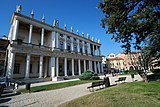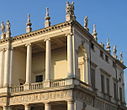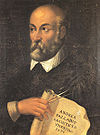Palazzo Chiericati: Difference between revisions
+category |
Mistico Dois (talk | contribs) mNo edit summary |
||
| (86 intermediate revisions by 52 users not shown) | |||
| Line 1: | Line 1: | ||
{{Use dmy dates|date=June 2021}} |
|||
[[Image:Palazzo Chiericati.jpg|thumb|300px|The façade of Palazzo Chiericati, in Vicenza.]] |
|||
{{Infobox UNESCO World Heritage Site |
|||
'''Palazzo Chiericati''' is a [[Renaissance]] palace in [[Vicenza]] (northern [[Italy]]), designed by [[Andrea Palladio]]. Since [[1855]] it has been the Museo Civico ("Town Museum") and, more recently, the City's art Gallery. Like the other Palladian buildings of Vicenza, it is part of the UNESCO [[World Heritage Site]] ''[[The Palladian Villas of the Veneto]]''. |
|||
| image = Image:Palazzo Chiericati (Vicenza).jpg |
|||
| image_upright = 1.2 |
|||
| caption = |
|||
| location = [[Vicenza]], [[Province of Vicenza]], [[Veneto]], [[Italy]] |
|||
| part_of = [[City of Vicenza and the Palladian Villas of the Veneto]] |
|||
| includes = <!--replace by summary if the list of sub-entities is too large or incomplete--> |
|||
| criteria = {{UNESCO WHS type|(i)(ii)}}(i)(ii) |
|||
| ID = 712bis-001 |
|||
| coordinates = {{coord|45|32|57|N|11|32|57|E|display=title|type:landmark_source:frwiki}} |
|||
| year = 1994 |
|||
| extension = 1996 |
|||
| website = {{URL|https://www.museicivicivicenza.it/it/mcp/}} |
|||
| locmapin = Italy Veneto#Italy |
|||
| map_caption = |
|||
}} |
|||
The '''Palazzo Chiericati''' is a [[Renaissance]] palace in [[Vicenza]] (northern [[Italy]]), designed by [[Andrea Palladio]]. |
|||
| ⚫ | |||
== History == |
|||
| ⚫ | The |
||
| ⚫ | Palladio was asked to design and build the palazzo by Count [[Chiericati family|Girolamo Chiericati]]. The architect started building the palace in 1550, and some further work was completed under the patronage of Chiericati's son, Valerio. However, the palazzo was not fully finished until about 1680, possibly by [[Carlo Borella]]. |
||
Palladio also designed a country home, the [[Villa Chiericati]], for the family. |
|||
| ⚫ | The |
||
| ⚫ | The palazzo was built in an area called "piazza dell'Isola" (island square, currently Piazza Matteotti), which housed the wood and cattle market. At that time, it was an islet surrounded by the Retrone and Bacchiglione streams, and to protect the structure from the frequent floods, Palladio designed it on an elevated position: the entrance could be accessed by a triple Classic-style staircase. |
||
| ⚫ | |||
| ⚫ | |||
== Architecture == |
|||
| ⚫ | |||
| ⚫ | The palazzo's principal façade is composed of three bays, the central bay projecting slightly. The two end bays have [[loggia|logge]] on the [[piano nobile]] level, while the central bay is closed. The façade has two [[superposed order]]s of columns, [[Doric order|Doric]] on the lower level with [[Ionic order|Ionic]] above. The roof line is decorated by [[statue|statuary]]. |
||
<gallery mode="packed" heights="160px"> |
|||
File:Palazzo Chiericati pianta Bertotti Scamozzi 1776.jpg|Floor plan (drawing by Ottavio Bertotti Scamozzi, 1776) |
|||
File:Palazzo Chiericati sezione Bertotti Scamozzi 1776.jpg|Cross section (Ottavio Bertotti Scamozzi, 1776) |
|||
</gallery> |
|||
== Conservation == |
|||
Since 1855 the building has housed the Museo Civico ('City Museum') and, more recently, the city's art gallery. It has received international protection since 1994, along with the other Palladian buildings of Vicenza, as part of a [[World Heritage Site]]. (The site originally designated was "Vicenza, City of Palladio" which included the city of Vicenza and its immediate surroundings. In 1996, [[UNESCO]] expanded the World Heritage Site to include villas outside the core area and renamed it "[[City of Vicenza and the Palladian Villas of the Veneto]]"). |
|||
==Gallery== |
==Gallery== |
||
<gallery> |
<gallery widths="160px" heights="110px"> |
||
File:Vicenza, Palazzo Chiericati.jpg|The double loggia. |
|||
File:Beelden daklijst palazzo Chiercati.jpg|Detail of the roofline |
|||
| ⚫ | |||
File:Palazzo Chiericati (Vicenza) by night.jpg|By night |
|||
Image:Villa_Chiericati_portico_ceiling.jpg|Ceiling on opposite side of the facade |
|||
| ⚫ | |||
File:Palazzo Chiericati Vicenza vestibule ceiling.jpg|Ceiling panel in the vestibule |
|||
| ⚫ | |||
File:Palazzo Chiericati ceiling 2.jpg|Ceiling [[fresco]] paintings and ornamental stucco |
|||
File:Onamental ceiling Palazzo Chiericati Vicenza.jpg|Intricate ceiling coffers and frescos |
|||
| ⚫ | |||
</gallery> |
</gallery> |
||
| ⚫ | |||
| ⚫ | |||
| ⚫ | |||
{{commons category|Palazzo Chiericati (Vicenza)}} |
|||
| ⚫ | |||
* www.museicivicivicenza.it |
|||
[[Category:Buildings and structures in the Veneto]] |
|||
| ⚫ | |||
| ⚫ | |||
| ⚫ | |||
| ⚫ | |||
| ⚫ | |||
{{Authority control}} |
|||
[[mk:Палацо Кјерикати]] |
|||
| ⚫ | |||
[[Category:Houses completed in 1680]] |
|||
| ⚫ | |||
| ⚫ | |||
[[Category:World Heritage Sites in Italy]] |
|||
[[Category:1680 establishments in Italy]] |
|||
| ⚫ | |||
Latest revision as of 14:19, 25 July 2022
| UNESCO World Heritage Site | |
|---|---|
 | |
| Location | Vicenza, Province of Vicenza, Veneto, Italy |
| Part of | City of Vicenza and the Palladian Villas of the Veneto |
| Criteria | Cultural: (i)(ii) |
| Reference | 712bis-001 |
| Inscription | 1994 (18th Session) |
| Extensions | 1996 |
| Website | www |
| Coordinates | 45°32′57″N 11°32′57″E / 45.54917°N 11.54917°E |
The Palazzo Chiericati is a Renaissance palace in Vicenza (northern Italy), designed by Andrea Palladio.
History
[edit]Palladio was asked to design and build the palazzo by Count Girolamo Chiericati. The architect started building the palace in 1550, and some further work was completed under the patronage of Chiericati's son, Valerio. However, the palazzo was not fully finished until about 1680, possibly by Carlo Borella.
Palladio also designed a country home, the Villa Chiericati, for the family.
The palazzo was built in an area called "piazza dell'Isola" (island square, currently Piazza Matteotti), which housed the wood and cattle market. At that time, it was an islet surrounded by the Retrone and Bacchiglione streams, and to protect the structure from the frequent floods, Palladio designed it on an elevated position: the entrance could be accessed by a triple Classic-style staircase.
Architecture
[edit]The palazzo's principal façade is composed of three bays, the central bay projecting slightly. The two end bays have logge on the piano nobile level, while the central bay is closed. The façade has two superposed orders of columns, Doric on the lower level with Ionic above. The roof line is decorated by statuary.
-
Floor plan (drawing by Ottavio Bertotti Scamozzi, 1776)
-
Cross section (Ottavio Bertotti Scamozzi, 1776)
Conservation
[edit]Since 1855 the building has housed the Museo Civico ('City Museum') and, more recently, the city's art gallery. It has received international protection since 1994, along with the other Palladian buildings of Vicenza, as part of a World Heritage Site. (The site originally designated was "Vicenza, City of Palladio" which included the city of Vicenza and its immediate surroundings. In 1996, UNESCO expanded the World Heritage Site to include villas outside the core area and renamed it "City of Vicenza and the Palladian Villas of the Veneto").
Gallery
[edit]-
The double loggia.
-
Detail of the roofline
-
By night
-
Painted ceiling in the open loggia
-
Ceiling panel in the vestibule
-
Ceiling fresco paintings and ornamental stucco
-
Intricate ceiling coffers and frescos
External links
[edit]- www.museicivicivicenza.it
- Great buildings online retrieved 18.VIII.06
- Palazzo Chiericati – Vicenza – (1550) Description, photographs and location map (in Italian and English)














